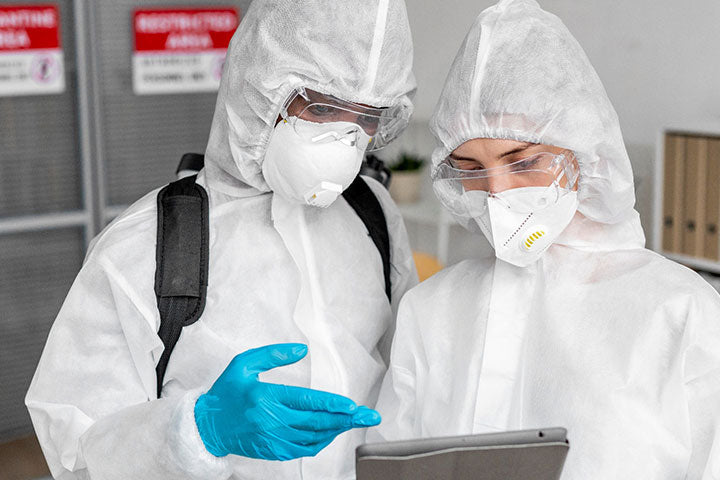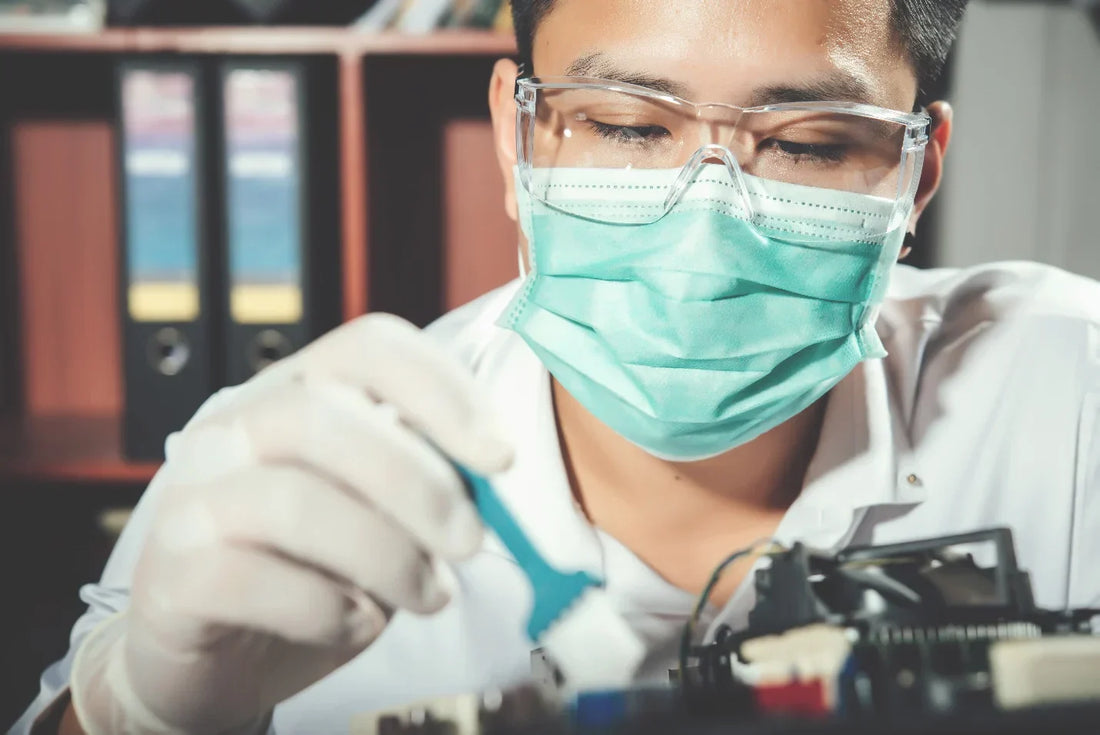5 Reasons to Upgrade Your Lab with a Refrigerated Laboratory Centrifuge

Summary:
-
Modern labs need equipment that balances precision, efficiency, and long-term value.
-
Unlike standard models, refrigerated centrifuges prevent heat buildup, protecting sensitive samples like proteins, enzymes, and nucleic acids.
-
By maintaining low, stable temperatures, they ensure reliable results, reduce sample loss, and improve workflow efficiency.
-
They support diverse applications with flexibility in sample sizes, rotor types, and compatibility with single-use accessories to maintain sterility and reduce contamination risks.
-
Trusted brands such as Eppendorf, Beckman Coulter, and Thermo Fisher provide reliable performance, safety features, and long-term service support.
-
Choosing the right centrifuge requires evaluating sample types, temperature control, rotor flexibility, ease of use, space, brand reputation, and overall return on investment.
-
Ultimately, a refrigerated centrifuge is not just an upgrade but an essential tool that boosts accuracy, efficiency, and regulatory compliance, making it a high-value investment for any modern laboratory.
Introduction
Running a modern laboratory means balancing precision with operational efficiency. For scientists, maintaining sample integrity is essential to producing reliable results. And for lab managers, any investment must have long-term value, be consistent, and enhance workflow. A refrigerated laboratory centrifuge addresses both needs.
Unlike standard centrifuges, refrigerated models prevent heat buildup during high-speed spins. This protects heat-sensitive samples such as proteins, enzymes, and nucleic acids, enabling consistency and productivity in the lab.
Investing in a refrigerated centrifuge is not just a wise investment with incredibly high ROI. It also contributes to the accuracy, efficiency, and reliability of your lab results. This article outlines five clear benefits of upgrading your centrifuge.
What Is a Refrigerated Laboratory Centrifuge?
A refrigerated centrifuge is a laboratory equipment that is used to separate and isolate substances based on their density by subjecting them to high-speed rotational forces. It is similar to a regular centrifuge, but with the additional ability to keep samples at low temperatures during the centrifugation process.
The primary purpose of refrigeration in centrifuges is to prevent heat generation and maintain the sample at a low temperature. This is particularly useful when dealing with heat-sensitive materials such as enzymes, DNA, and proteins. It preserves the integrity of these samples and prevents degradation that could occur with high temperatures.
Some refrigerated centrifuge brands, such as Eppendorf and Thermo Fisher Scientific centrifuges, offer precise temperature control, user-friendly design, and improved functionality.
Reason #1: Enhanced Temperature Control for Sensitive Samples

One of the most significant advantages of refrigerated centrifuges is the ability to keep sample temperature low and stable throughout the centrifugation process.
A refrigerated centrifuge maintains a temperature in the range of -20°C and +40°C, as even a slight increase in temperature can denature proteins, degrade nucleic acids, and compromise cell viability.
For scientists, investment in refrigerated centrifuges means more reliable experimental outcomes. And for lab managers, it means fewer failed experiments, reduced sample waste, and greater confidence in lab results.
Reason #2: Extended Sample Integrity and Consistency
Refrigerated centrifuges maintain stable and low temperatures during centrifugation by preventing heat buildup and inconsistent temperatures.
This protection is critical in regulated environments such as clinical diagnostics, pharmaceuticals, and biotechnology research. It ensures that your samples maintain the same chemical and biological properties throughout all stages of testing and engenders reliable results.
Reason #3: Boosted Lab Efficiency and Versatility
A refrigerated centrifuge not only preserves sensitive samples. It also improves workflow and efficiency in the lab. This equipment allows teams to run multiple protocols, reducing the need for repeat tests and additional equipment.
Refrigerated centrifuges can accommodate various types of samples, from small vials to large bottles, making them suitable for diverse scientific needs. This versatility allows laboratories to use a single equipment for multiple uses across various scientific disciplines without affecting lab efficiency and functionality.
Reason #4: Compatibility with Single Use Centrifuge Accessories
Maintaining sterility and minimizing contamination are top priorities in a modern laboratory. A laboratory centrifuge is designed to work seamlessly with single-use accessories such as disposable tubes, bottles, and rotors. These accessories improve hygiene and simplify workflow by reducing the need for repeated cleaning and sterilization.
For scientists, single-use accessories ensure that sensitive biological samples remain uncontaminated and consistent across various experiments. This is particularly valuable in molecular biology, virology, and clinical diagnostics, where even a minor contamination can compromise results.
Compatibility with single-use accessories also ensures compliance with regulatory standards and reduces maintenance costs by limiting wear and tear. It also enhances the safety and efficiency of the laboratory.
Reason #5: Trusted Performance from Reputable Brands
When investing in a laboratory centrifuge, reliability is just as important as performance. A refrigerated centrifuge is a long-term purchase, so choosing from a trusted manufacturer ensures your lab benefits from proven technology, dependable service, and strong warranty support.
Leading suppliers such as Beckman Coulter, Eppendorf, and Thermo Fisher Scientific have reputations for producing high-quality centrifuges that meet the demands of clinical, academic, and industrial labs. These brands offer advanced safety features, intuitive controls, and customizable options to help your team achieve its scientific goals.
How to Choose the Right Refrigerated Lab Centrifuge

Sample Type and Volume
Consider the nature of your work. Different samples, such as blood, live cells, and DNA/RNA, require different centrifuges and speeds. You should also consider the space available in your lab. If you have limited space, a benchtop centrifuge would be ideal for your space, while floor-standing units are better for larger labs.
Temperature Range and Control
Labs handling temperature-sensitive samples like enzymes, proteins, and cells should prioritize models with a stable and accurate temperature control. Check the operating temperature range and precision systems. Ensure the temperature is in the range of -20°C to +40°C and the equipment has advanced control systems, enabling stable temperature control.
Rotor Options and Flexibility
Flexibility comes from having multiple rotor types. There are two main types of rotors: angular and swinging buckets.
Angular rotors have a fixed angle, while bucket rotors swing out to accommodate different tube sizes. A model that is compatible with different rotors will allow your team to adapt quickly to other workflows.
Ease of Use and Digital Controls
A user-friendly interface makes your centrifuge easier to use. Modern refrigerated centrifuges come with intuitive digital interfaces, programmable settings, and memory storage for recurring protocols.
They also include advanced safety features such as imbalance detection, automatic lid locking, and bio-containment lids, especially for hazardous materials.
Lab Space
Space is often limited in laboratories, especially in academic or private labs. If you have limited space, a benchtop model will help save space while still delivering powerful performance. Meanwhile, floor-standing models can take more samples.
You should also consider ventilation and clearance requirements, as refrigerated centrifuges require proper airflow for cooling efficiency.
Brand Reputation and Service Support
Consider getting your equipment from reputable brands like Thermo Fisher Scientific, Eppendorf, and Beckman Coulter. These brands are established manufacturers with years of quality and trusted service. They assure performance, serviceability, and spare parts availability.
Pay attention to your warranty terms, service contracts, and the manufacturer’s local support presence in case of unexplained downtime. These additional terms help make your investment worthwhile.
Budget and ROI
In choosing the right refrigerated centrifuge, consider the total cost of ownership. A durable, reliable centrifuge with strong service support may cost more initially. But it will pay for itself by minimizing sample loss, downtime, and extending equipment lifespan. A new centrifuge might have fewer maintenance needs, helping to save more money in the long term.
Conclusion
A refrigerated laboratory centrifuge is more than just an upgrade for your lab. It improves operational efficiency, reduces sample wastage and downtime, and ensures reliable and accurate scientific results.
For scientists, this equipment is essential for handling temperature-sensitive materials, preserving sample integrity, and ensuring accuracy and reliability in scientific results. And for lab managers, it is necessary for regulatory compliance and efficiency.
Whether your lab is processing clinical specimens, handling nucleic acids, or running high-volume research, the ability to combine high-speed separation with precise temperature control is a clear advantage. Add to that the compatibility with single-use centrifuge accessories and versatile rotor options, and it is easy to see why refrigerated centrifuges are a must-have in modern laboratories.
At R&D Laboratory Equipment, we provide reliable scientific equipment for low-budget labs and research institutions. Check our catalogue of centrifuges.
FAQs
1. What’s the difference between a standard and a refrigerated lab centrifuge?
A standard centrifuge generates heat during the centrifugation process, which can compromise the integrity of sensitive materials. Meanwhile, refrigerated models maintain a low and stable control throughout the process, preventing sample degradation and denaturation.
2. Is a benchtop refrigerated centrifuge suitable for small labs?
Yes. Benchtop centrifuges are compact, energy-efficient, and designed to fit smaller spaces without sacrificing performance.
3. When should I use single use centrifuge tubes?
Single-use centrifuge tubes are best when you’re working with sensitive biological materials or when sterility is essential. They reduce the risk of cross-contamination, preserving the integrity of the scientific process.
4. Why consider a Fisher Scientific centrifuge?
Thermo Fisher Scientific products have a proven track record of reliability and accuracy. They also come with warranty coverage and strong technical support.
5. Can I upgrade my existing centrifuge to a refrigerated model?
Upgrading a standard centrifuge to a refrigerated unit is not possible because the cooling system must be built into the design. Instead, you can add a refrigerated model along with your current centrifuge.
6. How to choose the right centrifuge?
Before buying a centrifuge, consider the speed, rotor options, size, lab space, your budget, and safety features available.
7. Why are some centrifuges refrigerated?
Centrifuges are refrigerated to maintain the integrity of temperature-sensitive samples such as proteins, enzymes, nucleic acids, live cells, and DNA/RNA.
8. What is the most important rule to remember when using a centrifuge?
Ensure the equipment is placed on a level and firm surface, ensure the lid is closed during operation, and remember to wear personal protective equipment.
9. Which is better, ventilated or refrigerated centrifuges?
The refrigerated centrifuge is better. This is because it can operate at higher speeds and keep the sample temperature stable for research purposes.
10. What is the most common error when using a centrifuge?
Using an unbalanced load is the most common error when using a centrifuge. An unbalanced load can cause the equipment to shake violently, potentially damaging some components or stopping it from working altogether.






